Iranian People have fun in ShirAbad waterfall. It is located in a dense picturesque forest, 6 km to the south of Khanbebin city, #Gorgan, #Golestan, #Iran.
Photo by Hamidreza Darajati
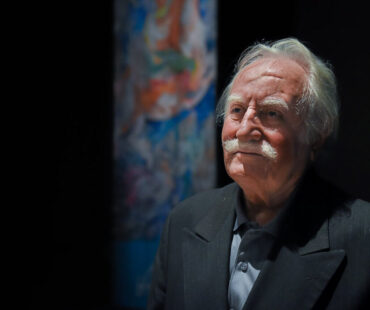
Renowned Iranian painter and educator Mahmoud Farshchian has passed away, as announced by the Academy of Arts on Saturday. He died at the age of 95 while hospitalized in the United States.
Born in the historic city of Isfahan in 1930, Mahmoud Farshchian was also a member of the Iranian Academy of Arts. His artistic journey began when his father enrolled him in the workshop of Haj Mirza Agha Emami, a prominent traditional artist. He later pursued further studies at the Isfahan School of Fine Arts under the guidance of Master Issa Bahadori.
Farshchian was the pioneer of a unique style and school within Iranian painting. While remaining true to the authentic foundations of this traditional art form, he expanded the horizons of Persian painting through innovative techniques.
Childhood: Nature, beauty, & family
Isfahan, Iran 1930
Born in Isfahan in 1930, Mahmoud Farshchian grew up in the proximity of Isfahan’s royal mosque, where the architectural masterpieces of the Safavid dynasty informed his understanding of art and beauty. No place in the world could have provided a better ambiance for the education of a traditional Persian artist. As a child, it was already clear that his life would be devoted to painting.
Ahmadabad & The Chicken House
Farshchian’s natural genius was nourished by his family’s deep appreciation for art in all its forms. Farshchian’s family home in the Ahmadabad neighborhood of Isfahan included trees, water fountains, pools, and a section called the Chicken House. His childhood memories of playing with the hens, roosters, pigeons, and sparrows are evident in his masterful depiction of their colors, feathers, and movements.
Beyond their physical appearance, Farshchian paid keen attention to their different moods and personalities. “There was this particular white rooster that was so friendly with me,” he remembers.
“I carried food for him in my pocket, and he would push his head into my pocket and eat them.”
“When a drop of light falls into the glass of a human soul, what would it create with love?”
-M.F.
Home & Family
Farshchian’s father Gholamreza was a successful Persian carpet dealer, and the home was furnished with antiques, Cretonne curtains, and many carpets woven by the masters Archang (Ahmad Hartamni) and Mirza. Father would sit, arms crossed, watching in silence for hours as his young son drew the carpets’ lines and patterns. He would just look at me from the corner of his eyes. It was then that I realized the effects of my passion for art in my life.
Farshchian’s parents shared a genuine love of God and religion. His mother Zahra would take her children to the Imamzadeh Ismael shrine near their house, where Farshchian would make pencil copies of the shrine’s many paintings of events of Karbala and Ashura. The shrine had a plane tree that was burnt from inside, an image that appears in many of Farshchian’s paintings. A pilgrimage to Karbala in the 1940s affected Farshchian deeply, as revealed in his designs for the new tomb of Imam Hussein decades later.
“I get my art-loving spirit from my father. Although he was a businessman and trader, he admired art….That’s how I developed my passion for art.”
-M.F.
Six Months of Darkness
At the age of five, Farshchian fell into the courtyard pool and almost drowned. Zahra saved his life by reaching in and pulling him out by his hair. His swirling, circular compositions reflect this harrowing near-death experience.
“I have had a brush with death and struck by the evil eye several times in my life.”
M.F.
Gholamreza and Zahra were avid readers, and together they amassed a library containing hundreds of rare books and manuscripts. Every Friday, family and friends gathered in the family home to recite The Book of Kings, Saadi, poems, and literary maxims. Once when Farshchian was six years old, he fell and hit his head running upstairs to fetch a Book of Kings from his mother’s reading shelf for his father and their guests. The accident left the young boy completely blind for six months. When the bandages came off, Farshchian experienced a psychedelic rush of colors. His vibrant, rainbow palette reflects his joy upon recovering his sight.
Education: A Young Artist in Golbahar school
Farshchian studied with the greatest masters of Persian art and literature in Isfahan. At Golbahar, the prestigious public school he attended, his teachers praised Farshchian’s artistry and encouraged him to study with Haj Mirza Agha Emami, an artist, carpet designer, and giant of Iranian Modernism. Farschian so impressed Haj Mirza with his talent, passion, and humility that he agreed to train the young student.
Haj Mirza
Haj Mirza taught Farshchian how to draw a gazelle. “When I got home, I was so excited,” Farshchian recalls. “I stayed up all night and drew about 200 gazelles: big ones, little ones….I felt like something was changing within me.” The next day, he took his portfolio to show the gazelles to Haj Mirza, who could not believe his eyes. He asked if Farshchian had drawn them all by himself or if he had traced them. “No, sir, I’d never do that. I just drew them,” Farshchian answered. Haj Mirza instructed Farshchian to draw a gazelle in his presence. After finishing quickly, Haj Mirza kissed him on the forehead and said, “You’ll become great! Work hard.”
Farshchian became Haj Mirza’s apprentice and continued to draw in pencil for four more years, mostly emulating Timurid and Safavid drawings. Then Farshchian began to study painting. Eventually, the precocious boy was helping carry out the studio’s commissions. The gazelle still holds a special place in Farshchian’s heart and appears throughout his body of work.
“I always got a perfect score, 20/20, in drawing, composition, literature, and other abstract lessons. Unfortunately, I was so untalented when it came to math.”
-M.F.
School of Fine Arts, Isfahan
Farshchian next attended the School of Fine Arts in Isfahan, where he kept the following sentence framed above his desk: “I should become a genius.” He studied miniature painting, drawing inspiration from the designs and tile patterns of Isfahan’s architectural monuments. Farshchian mastered the intricacies of pigments, binding mediums, and prepared his own brushes from white kitten hairs tied into bird quills tools so fine and flexible that he still uses them for delicate passages. Farshchian learned carpet design from the late master Issa Bahadori, who taught “with passion and love.” Farschian’ s artworks were gifted to every celebrity or diplomat who visited Iran.
Farschian also passionately studied literature, especially the poetry of Hafiz, Saadi, and Rumi. He and his friends would often attend poetry recitals at the Kamal Ismael Society, the Khakshir Society near the Jame’a Mosque, and the Poets Society behind the Chaharbagh School.
Adulthood: Around the World
First Solo Exhibition, 1948
Upon graduation from the School of Fine Arts, Farshchian held his first solo exhibition in 1948 at the Iranian-British Cultural Association’s office in Isfahan.
The Army
Like all Iranian boys, he was conscripted into the army at the age of eighteen. In awe of his artistic talent, his comrades and superiors allowed him to skip the drills so he could keep drawing and painting.
Vienna, Munich, & Paris
After performing his military service, Farshcian’s hyperpolyglot nature took him on a Grand Tour to absorb Western painting techniques. He enrolled at the Academy of Fine Art in Vienna, taking several trips to cities like Munich and Paris. Wherever he went, he would spend all his time at the museum.
“I was so passionate and thirsty….Every morning I would wait outside museums with my papers and pencils, and I’d go inside when they opened the doors, and I kept drawing and drawing….I continued working ‘till late in the afternoon when they wanted to close the doors.”
-M.F.
The Years In Between: Ostad Farshchian
The National Institute of Fine Arts, 1961
In 1961 at the age of thirty, Farshchian returned from his European tour to teach at The National Institute of Fine Arts (later The Ministry of Art and Culture).
The Department of National Arts
He organized exhibitions at the University of Tehran, where he rose to the position of Director of the Department of National Arts. He also designed carpets and worked so successfully in Syria that one of his vases was presented to Arthur Pope, the famous American scholar of Iranian art.
Istanbul, 1960: first international exhibit
Returning from one of his trips to Europe, Farshchian held exhibitions in the Chechen Sotoun Palace Museum in Isfahan, the Golestan Palace Museum, the Ministry of Art and Culture, University of Tehran, and the Museum of Ancient Iran. Farshchian’s first international exhibition was in 1960 in Istanbul, a watershed moment that sparked multiple exhibitions across the globe. His first exhibitions in the USA were in 1972 and 1973.
Istanbul, 1960: first international exhibit
Returning from one of his trips to Europe, Farshchian held exhibitions in the Chechen Sotoun Palace Museum in Isfahan, the Golestan Palace Museum, the Ministry of Art and Culture, University of Tehran, and the Museum of Ancient Iran. Farshchian’s first international exhibition was in 1960 in Istanbul, a watershed moment that sparked multiple exhibitions across the globe. His first exhibitions in the USA were in 1972 and 1973.
Family: A Husband & Father
Marriage, 1954
Friends since childhood, Mahmoud and Nia married when she was seventeen and he was twenty-four years old and welcomed two, later to become three, children. The first five years of their marriage were monumental for Farshchian’s career, as during this time she encouraged him to pursue his passion in the studio while she tended to the children, leading to his development and refinement of Surrnaturalism, the unique style for which he would be known.
Women
Farshchian drew upon his love for Nia as a constant inspiration for his work, and many of his paintings depict beautiful women in paradisiacal settings.
“I mostly draw women as angels in my work. Kind, compassionate women are indeed like angels. They are precious.”
-M.F.
The Iranian Revolution, 1979
The 1979 Iranian Revolution and tumultuous years after became a turning point for Farshchian and his family. With many friends arrested, exiled, and fleeing the country, Farshchian made the decision to leave Iran with his wife and children and began to seek out a new home.
His painting entitled “Quo Vadis/Where Are You Going?” describes the feeling that he, and 20 million other Iranians, had as friends disappeared and communities disintegrated during the revolution that would topple the last shah.
A Modern Master
America, 1983
Farshchian retired from teaching in 1980 and relocated to America with his family in 1983, settling in Englewood Cliffs, New Jersey, just across the Hudson River from New York City. There they raised their children and grandchildren and Farshchian continued to paint and take on projects in the U.S.A. and internationally.
Honors & Awards
He is included in Cambridge University’s list of the 2000 outstanding intellectuals of the 21st century and The European Academy of Culture’s Who’s Who in the 21st Century. Farshchian belongs to the Art and Professions Association of Italy and has received numerous awards and honorary memberships from universities and art centers across Europe and the USA.
International Acclaim
Farschian’s paintings are in the private collections of H.R.H. Queen Elizabeth II of England and Prince Philip, Queen Juliana of Netherlands, Prince Agha Khan, Crown Prince Akihito of Japan, former presidents and prime ministers of the US, France, Italy, Brazil, and India, William Fulbright, Arthur A. Pope; and Michael Jackson, among others.
There have been six books and countless articles published on his work, as he comes to be recognized as playing a decisive role in introducing Iranian art to the international art scene as well as broadening the possibilities and scope of traditional Iranian painting.
The Farshchian Museum
In 2001, The Farshchian Museum opened to the public in Isfahan. His works are also permanently installed in Farshchian Hall at The Astan Ghods Razavi Museum and in the Museum of Contemporary Arts, Mashhad.
“Art is a sacred matter. It’s a kind of worship. It’s like serving God.”
-M.F.
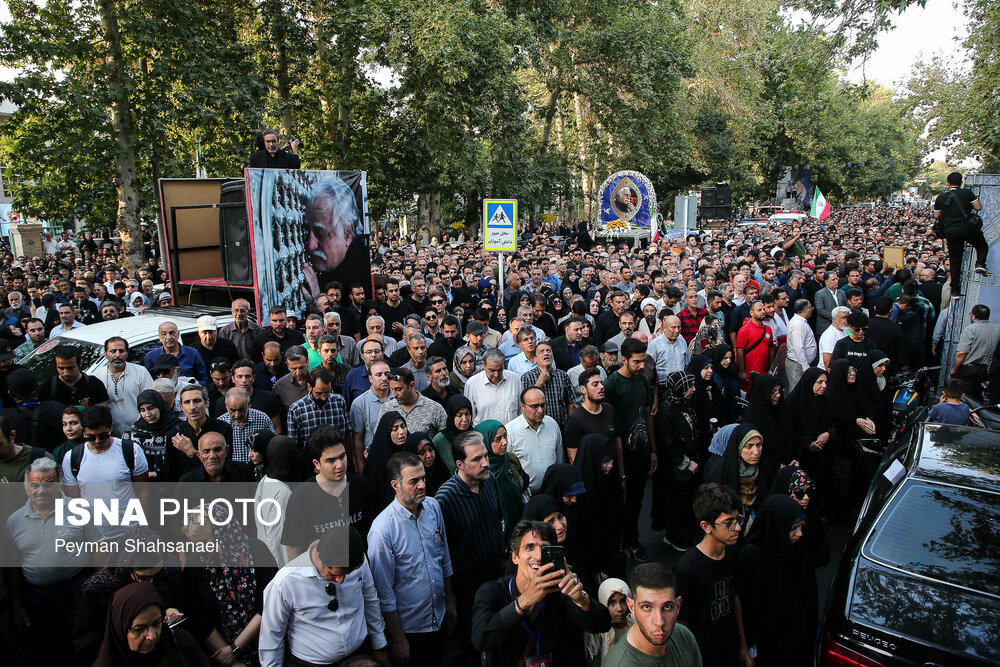
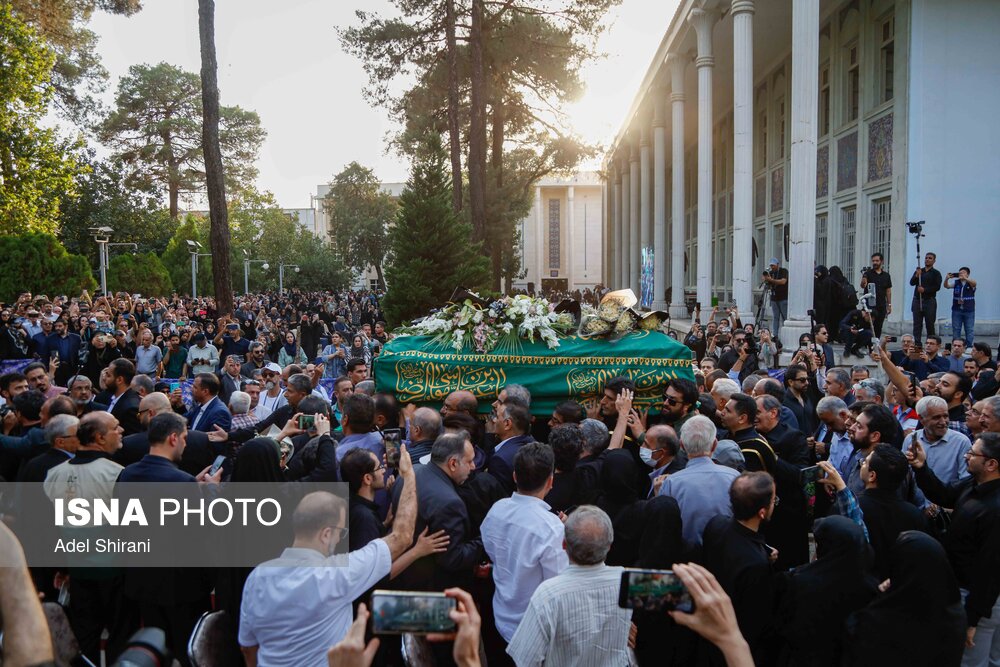
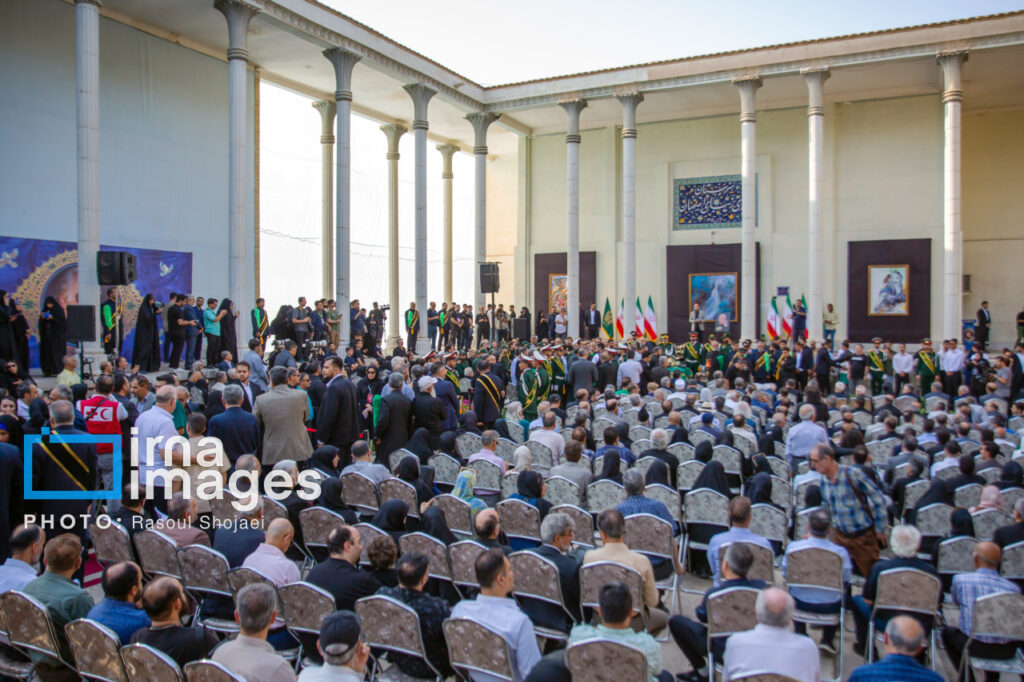
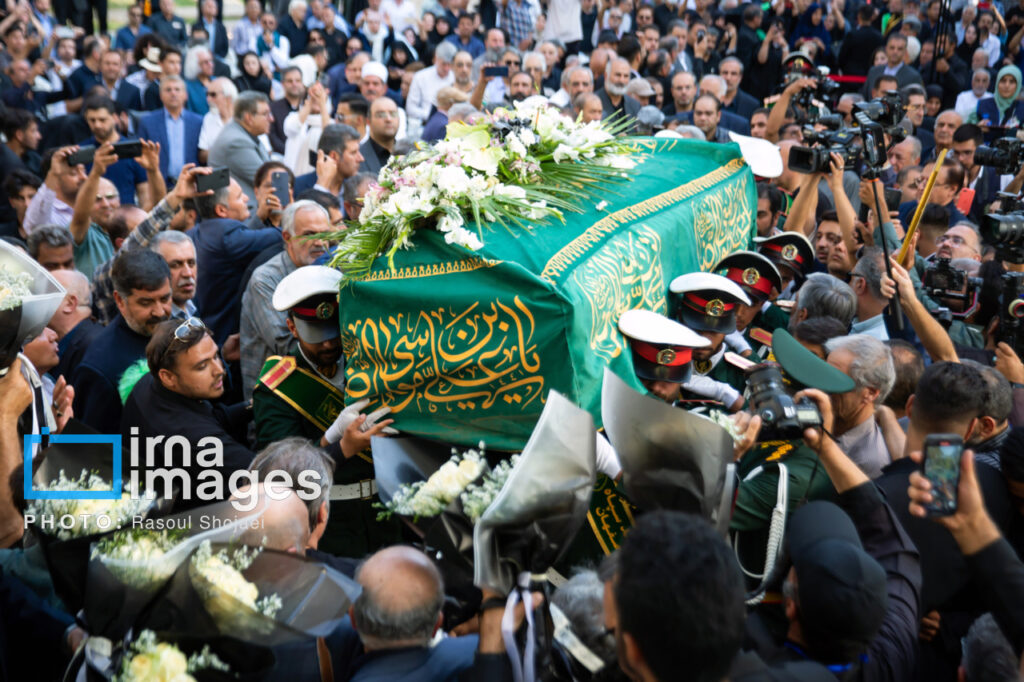
Farewell to Master Mahmoud Farshchian: A Heartfelt Funeral Ceremony in Isfahan
The funeral ceremony for Master Mahmoud Farshchian took place on Sunday evening, August 19, 2025, at the Isfahan School of Fine Arts. The event was attended by Minister of Culture and Islamic Guidance Seyyed Abbas Salehi, along with various officials and members of the public.
The esteemed artist was laid to rest beside the grave of the renowned Iranian poet Saeb Tabrizi.
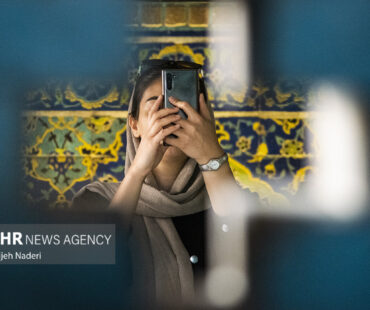
With the reduction of the corona pandemic crisis, Isfahan has been welcoming foreign tourists for some time.
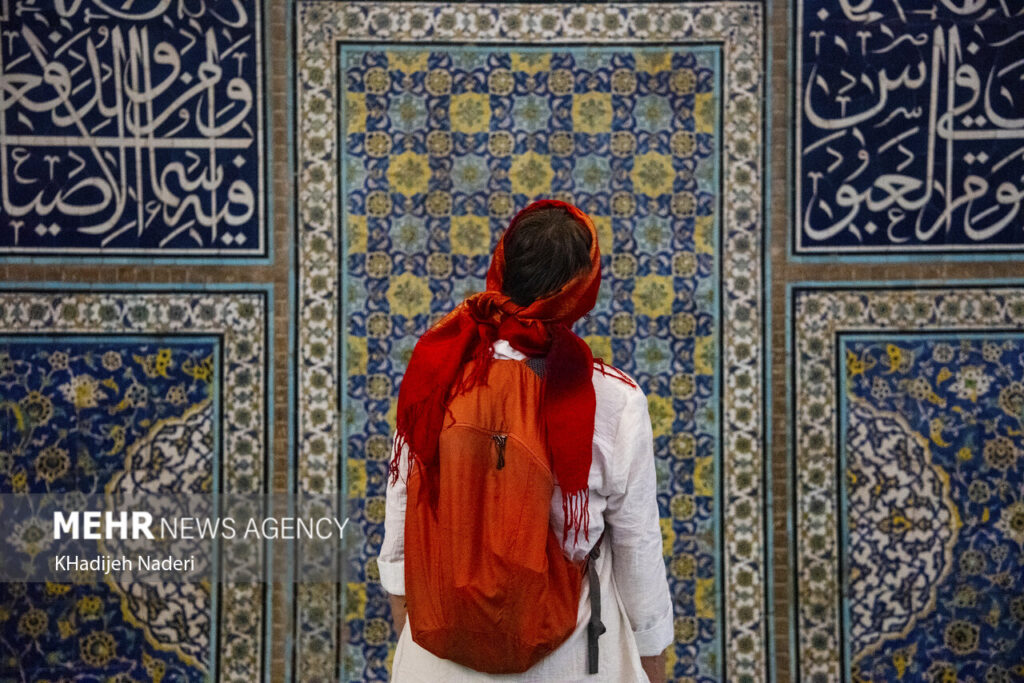
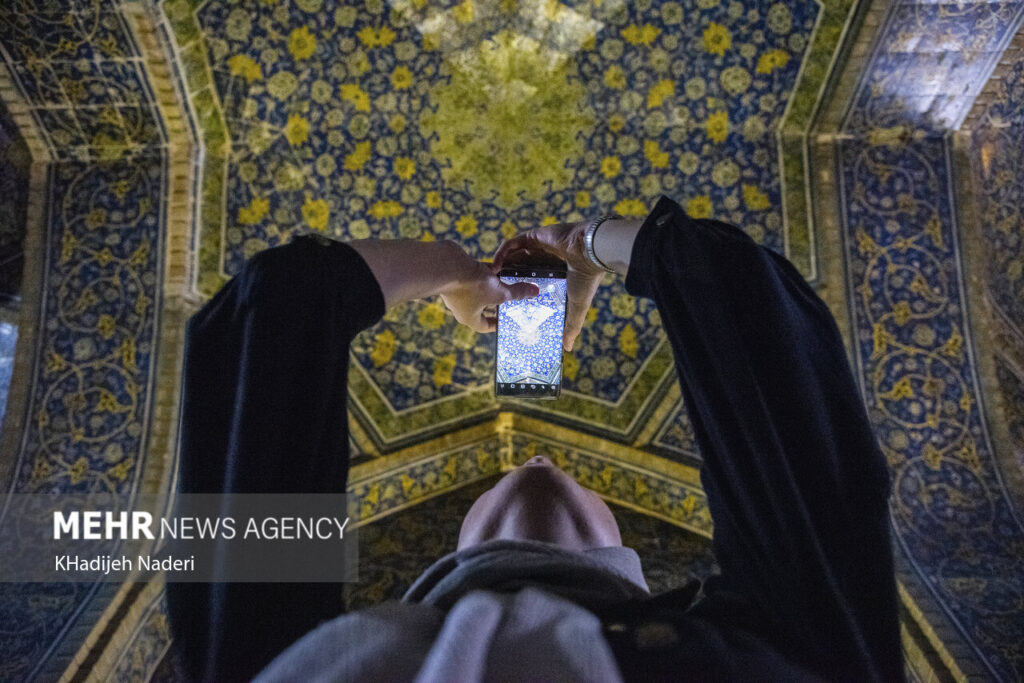
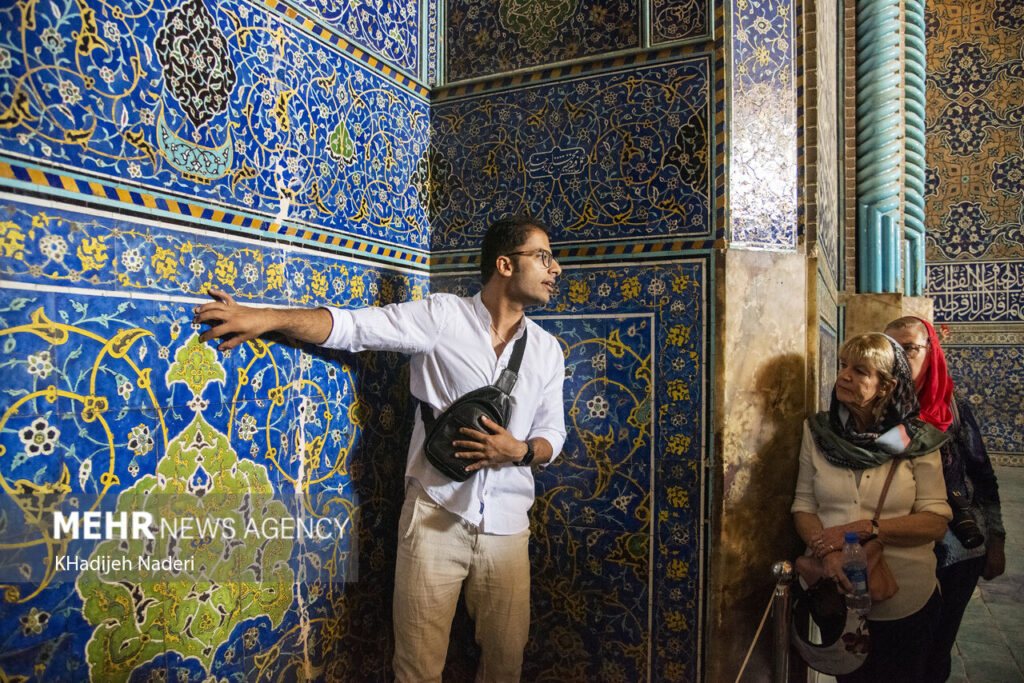
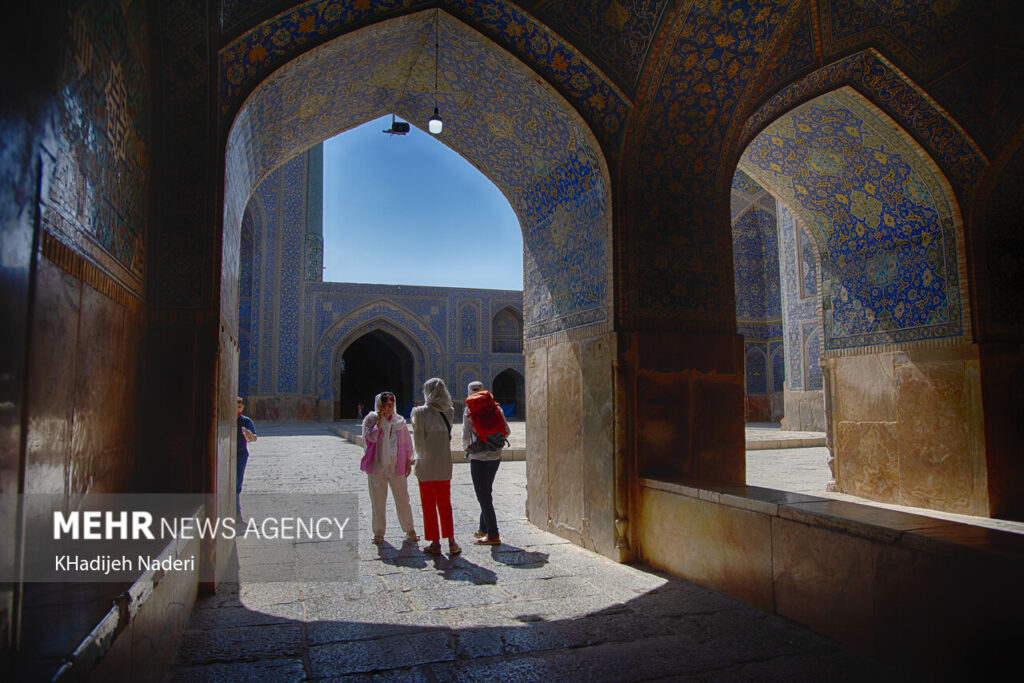
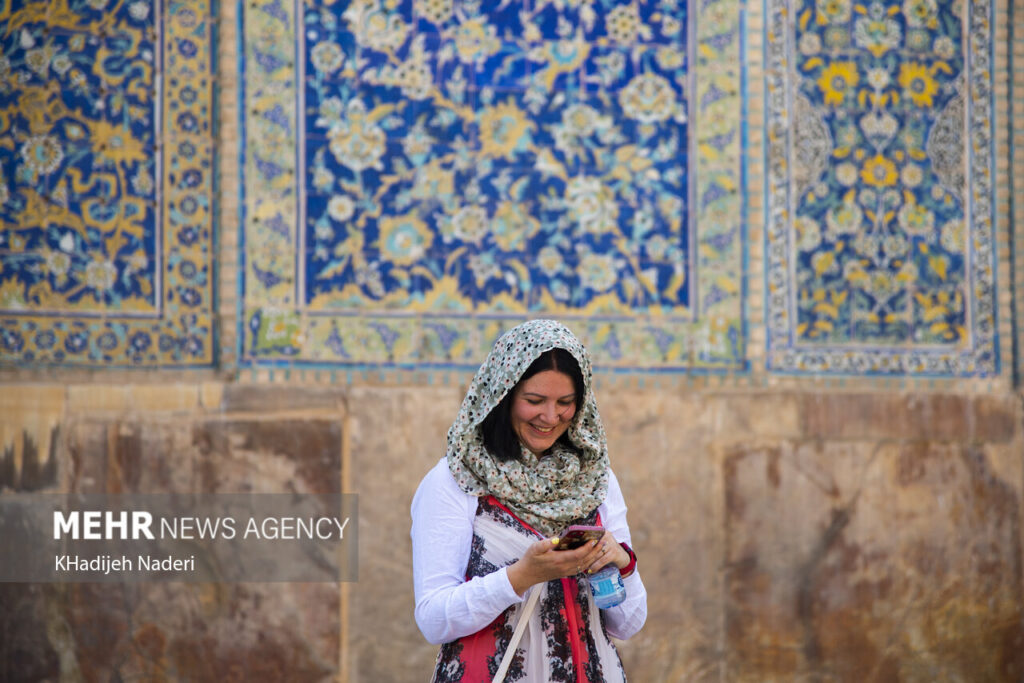
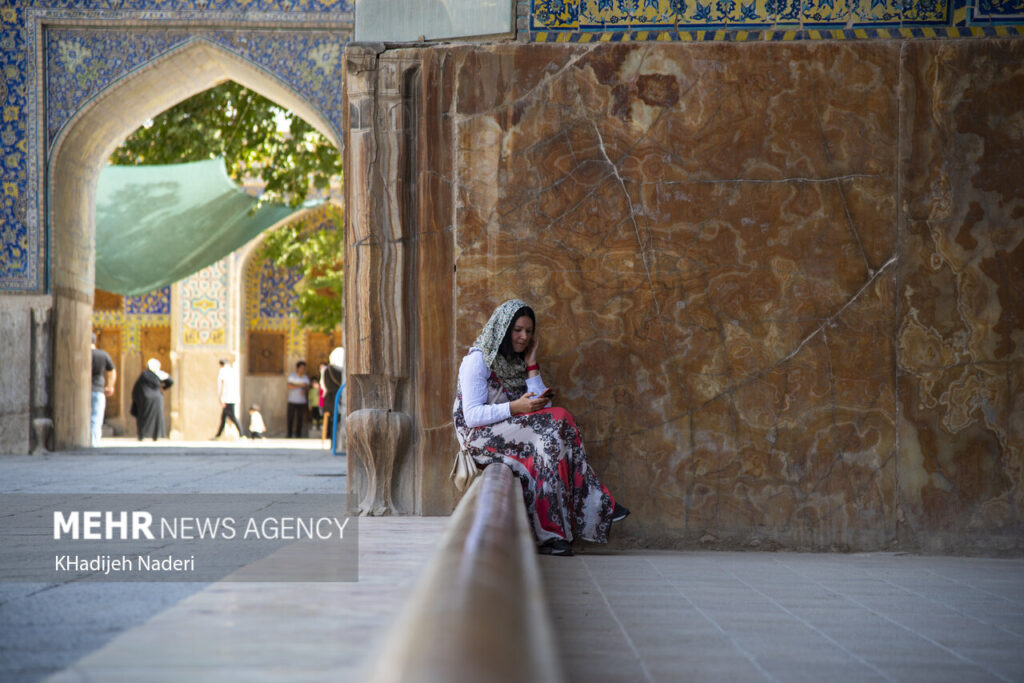
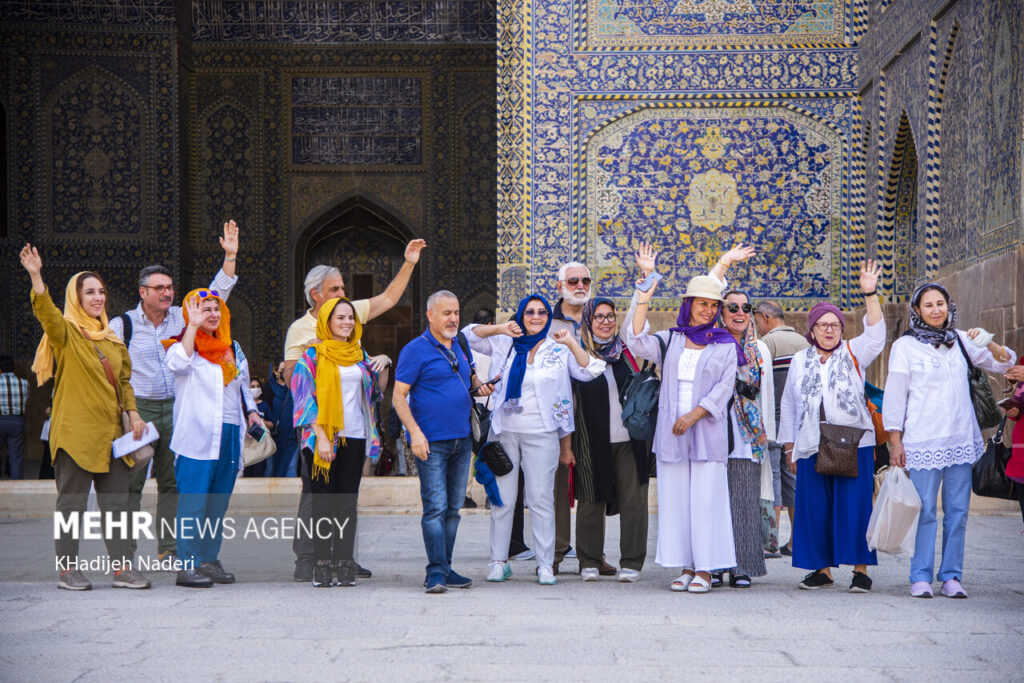
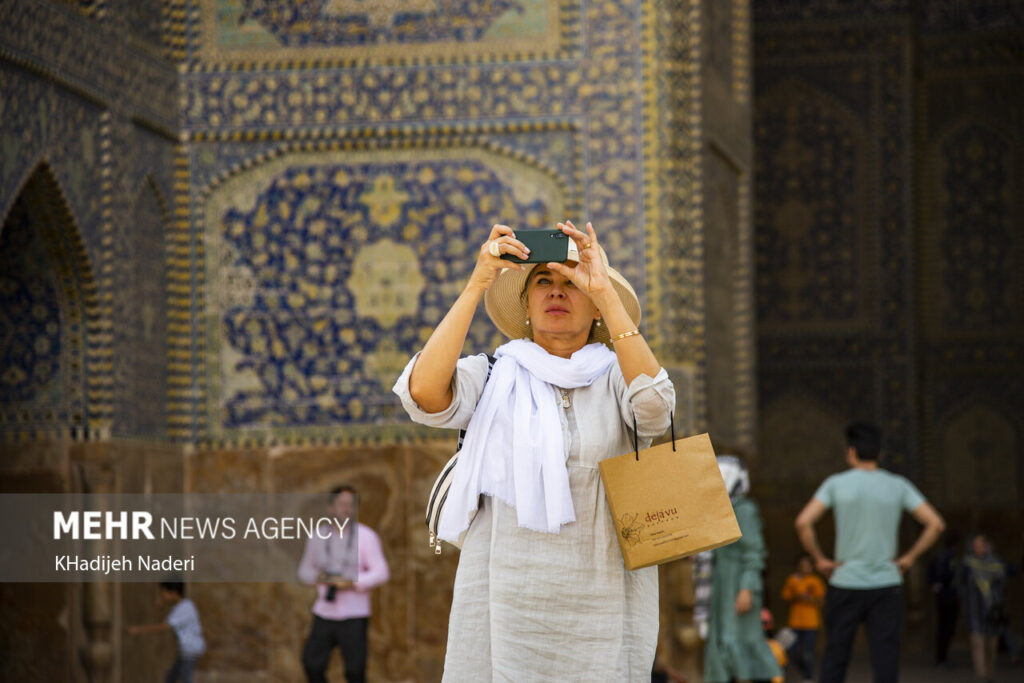
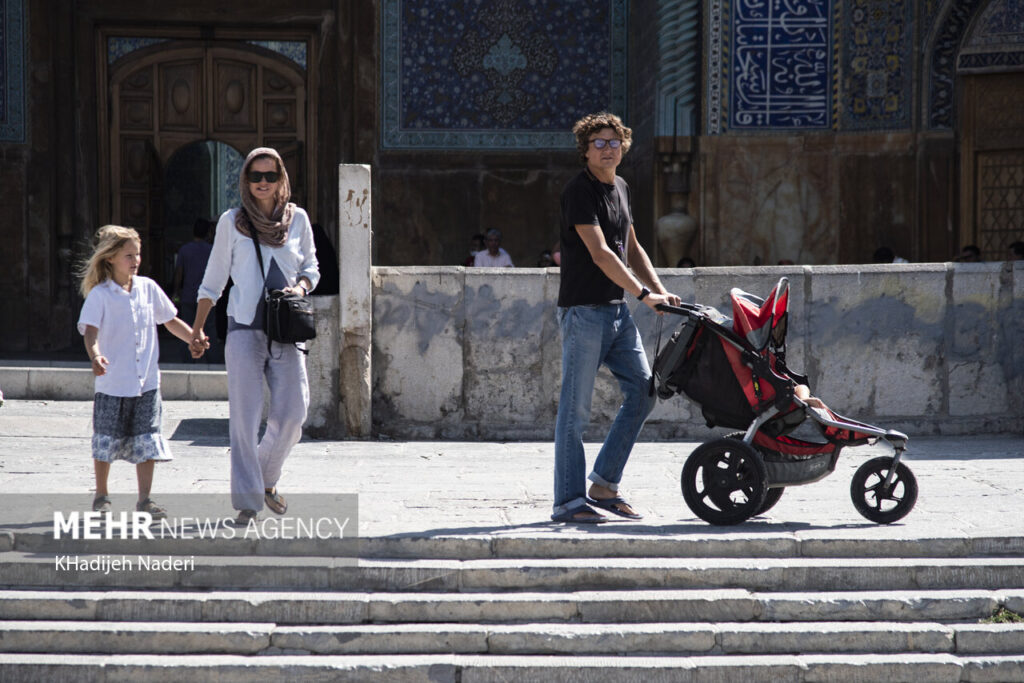
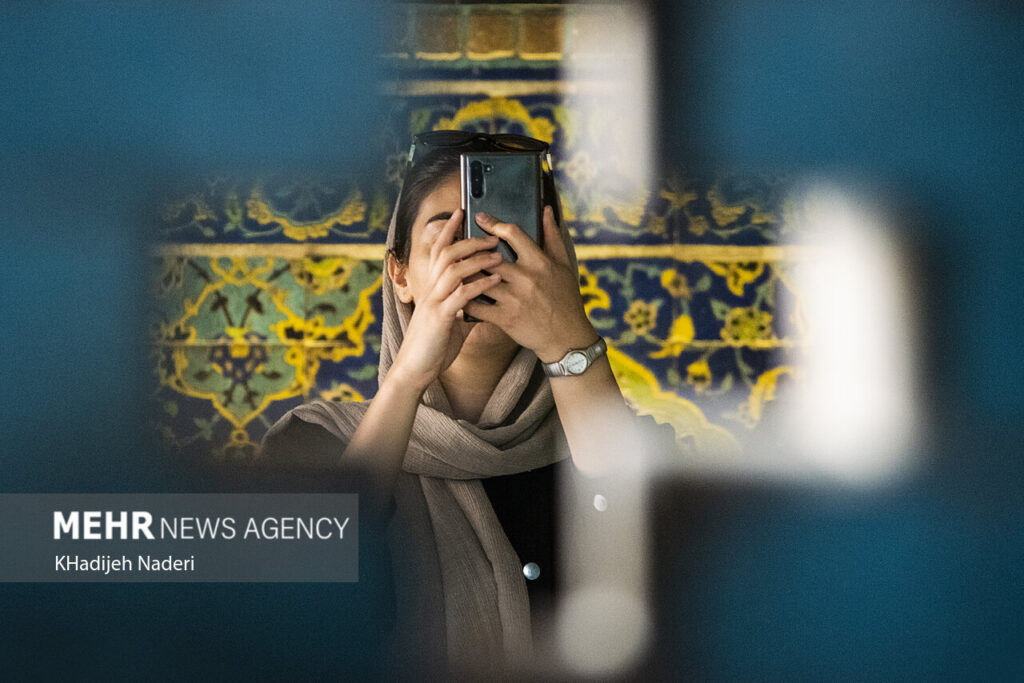
The traveler Mag introduce the 50 Most Beautiful Cities in the World and Isfahan is one of it.
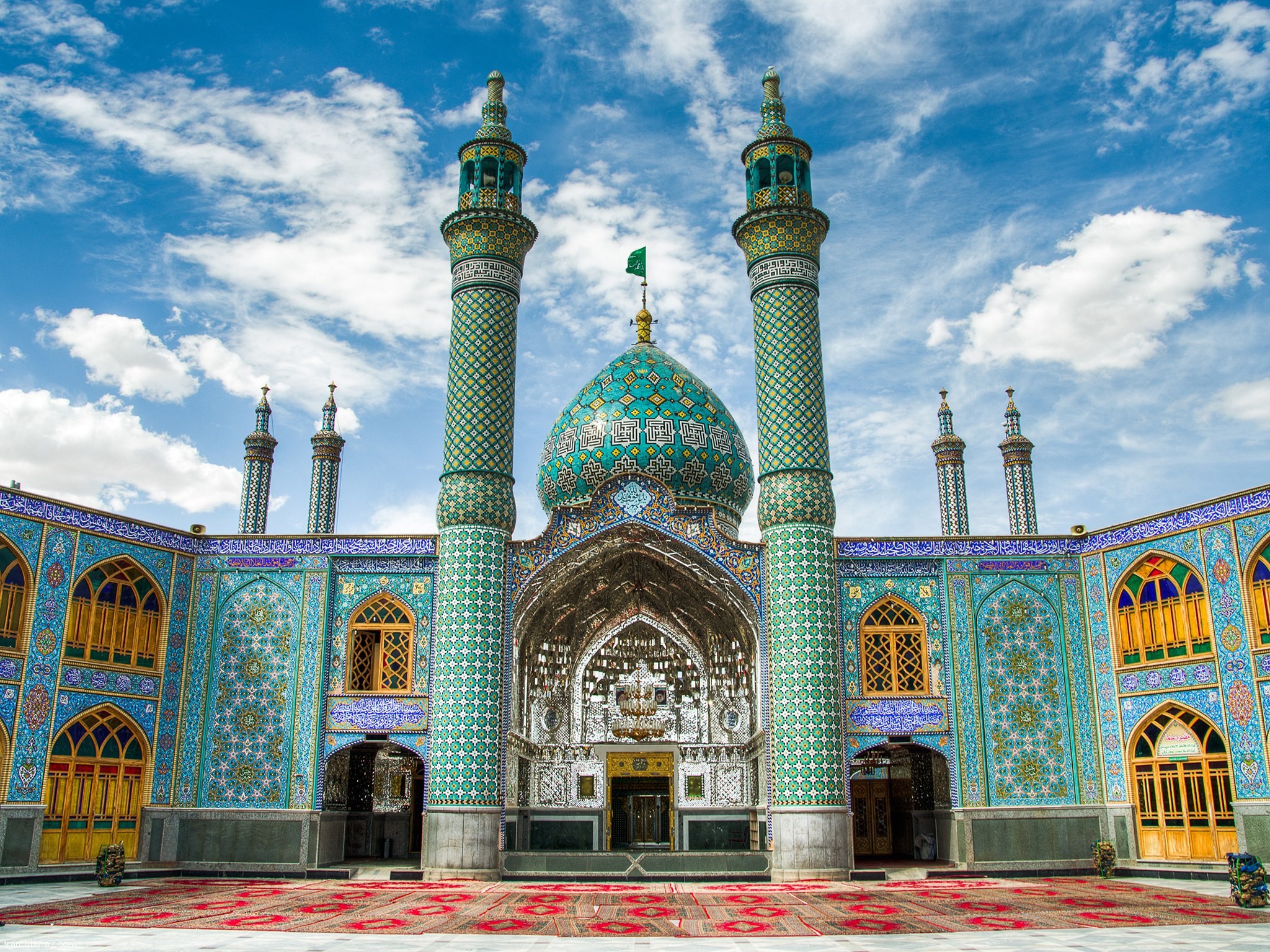
We seek beauty in many forms: through art and architecture; from water views and mountain highs; in its people and its history. This list circles the globe, finding the most beautiful cities in the world from Italy to Iran. Vote for your favorite cities in the 2016 Readers’ Choice Awards survey.
Once one of the largest cities in the world, Isfahan had such serious cosmopolitan clout in the 16th century that it inspired the phrase Isfahan nesf-e jahan, or “Isfahan is half the world.” Today, it’s is one of the country’s largest metropolises, and has wide, tree-lined boulevards, significant Islamic architecture, and hidden Persian gardens, all perfect for exploring.
cosmopolitan clout in the 16th century that it inspired the phrase Isfahan nesf-e jahan, or “Isfahan is half the world.” Today, it’s is one of the country’s largest metropolises, and has wide, tree-lined boulevards, significant Islamic architecture, and hidden Persian gardens, all perfect for exploring.

It has created a competitive environment which increasingly small business has an equal chance and right as huge companies, to provide their services to the world. But as all of the bright and innovative ideas technology has offered, this one is not without a shortcoming as well: the abundance and diversity of services provided by thousands of travel companies and agencies has turned internet to a confusing and chaotic space which made the process of decision-making for customers very difficult.
The first attempt for arranging travel agencies services in a clutter-free and organized manner in Iran was 3 years ago, when Safarmarket came to life. Since it was born, traveling has never been the same; Safarmarket was an evolution and game changer that opened the door to all possibilities and opportunities that tourism industry had to offer.
As the name implies, Safarmarket is an online market place which provide all of the travel addicts need, from booking a flight and guided tours to finding an inexpensive hotel, thanks to its mighty and efficient search engine, it can explores through hundreds of internet pages and extracts the best results according to your customized requirements and preferences.
First Travel Market In Iran
As mentioned before, Safarmarket is where it all started, it defined the meaning of online market bazar to Iranian people who had never been familiar with this concept. So far, it has connected hundreds of travel service providers with thousands of customers who had never been aware of these business companies’ existence before.
how Safarmarket works is very simple: it’s an integrated platform which travel service providers (more than 1900 travel agencies) are able to offer their products (tours, hotels and airline/train/bus tickets) so the customers can choose the right option after comparing different prices and considering the quality of services.
Not Just A Company, But A True Travel Companion
Customer’s satisfactions reflected on positive feedbacks are the most important objective for any trustworthy company, and Safarmarket‘s staff are fully aware of that. Through all the stages of your trip, you are never alone; you can always count on Safarmarket’s support on any difficulties you ever face during your travel. Safarmarket’s staffs are attentive and skilled at problem-solving and can help you tackle your troubles easily.

As the name implies, Safarmarket is an online market place which provide all of the travel addicts need, from booking a flight and guided tours to finding an inexpensive hotel, thanks to its mighty and efficient search engine, it can explores through hundreds of internet pages and extracts the best results according to your customized requirements and preferences.
Where Technology Meets Travel
Don’t let the simplicity of Safarmarket‘s page deceives you. It’s designed this way to be as user-friendly as possible, but under the hood, there are many codes and components are involved for this system to works impeccably and derives the best google results and brings them on the surface. thanks to the filters provided, finding the specific result by filling out the empty fields such as price of the ticket and flight class has now become possible and the chances of hitting the target and saving a lot of time by pressing a few clicks has increased enormously.
Tips For Finding The Cheapest Flights
The first and most important tip for finding the cheapest flight is to know where to look. Simply typing “cheap flight” on google gets you nowhere and is the worst strategy for finding a cheap flight ticket because google will bombard you with hundreds of results which none of them might meet your needs. for finding the cheapest flight, you have to rely on a website which is specifically design for this purpose and allow you to compare prices of different airlines and travel agencies in an organizes way.
Safarmarket is the best Iranian choice for searching hundreds deals and finding the best and cheapest bargain. You can also install Safarmarket’s app to be notified of discounts given on especial campaigns such as Orange Friday. Another tactic for finding the cheapest flights is to be flexible with the date you’re planning to travel; for instance, instead of traveling during the holidays and high seasons, you can book your flight at the least popular time of the year.
The last tip for hunting the cheapest flight ticket is to choose an indirect route. Rather than reaching your destination with a direct flight, you can buy a flight ticket for connecting transport and save a fair deal of money.

In the past 28 months, the crisis of the coronavirus pandemic(Covid-19) has affected various aspects of life, especially the livelihood and social relations of families. At the end of June 2022, due to the nationwide vaccination by the government, it can be said that the society has passed the corona crisis and the normal process has returned to people’s lives.
The Coronavirus headquarters also officially announced that it is not mandatory to use a mask outdoors.
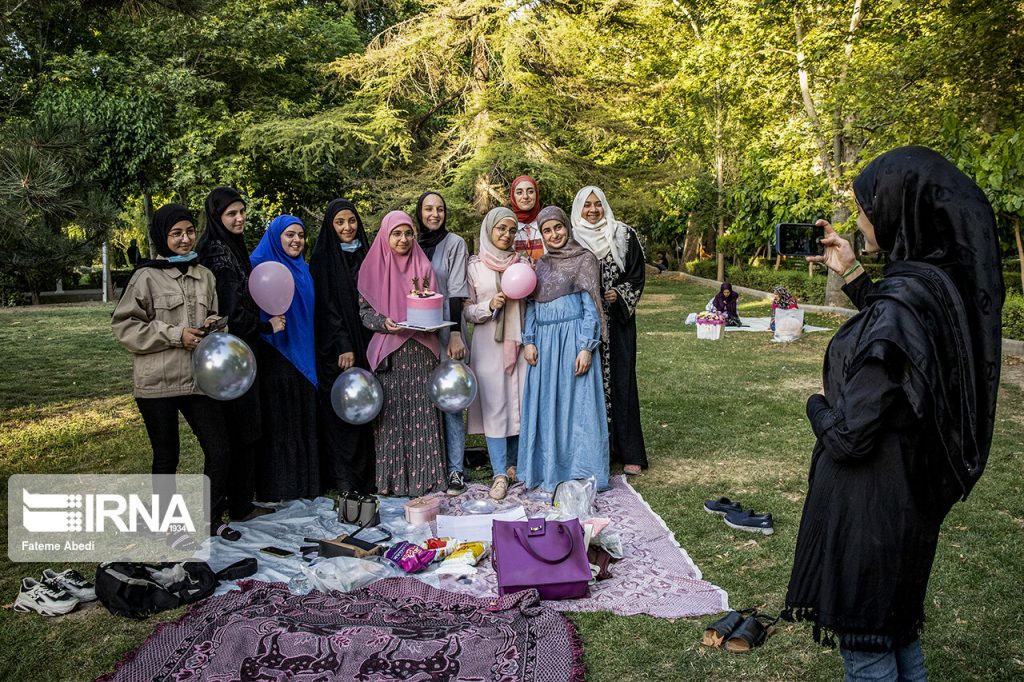
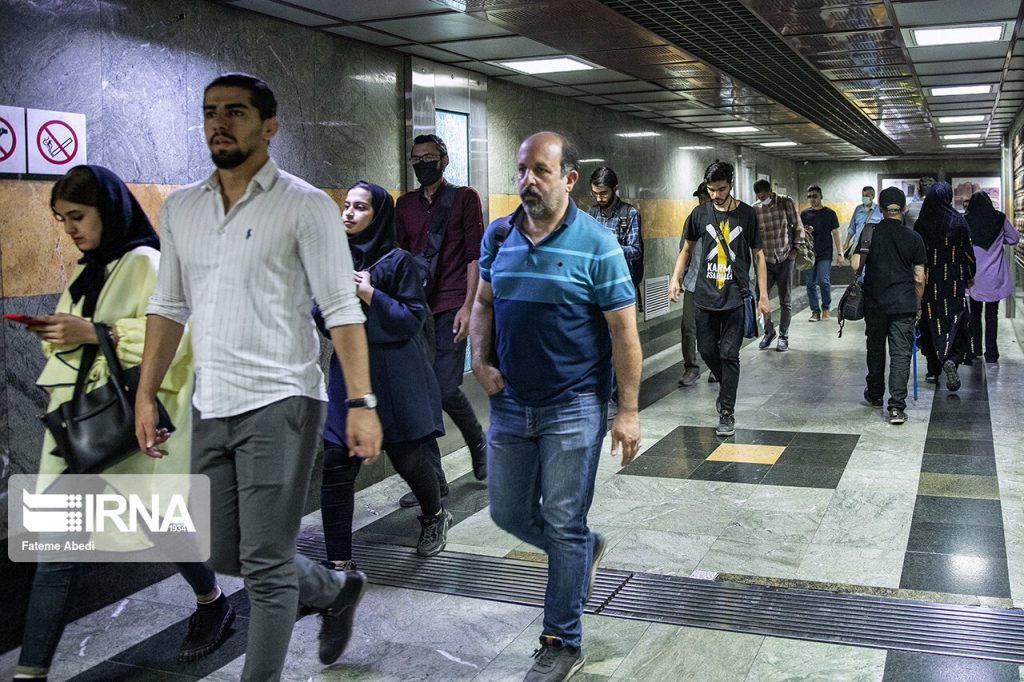
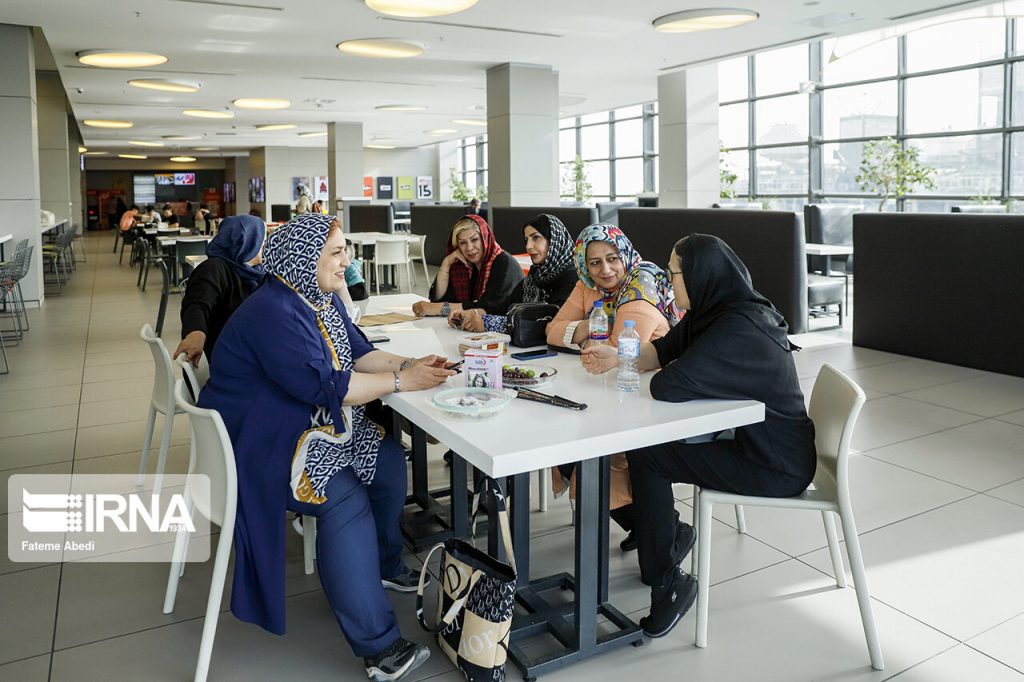
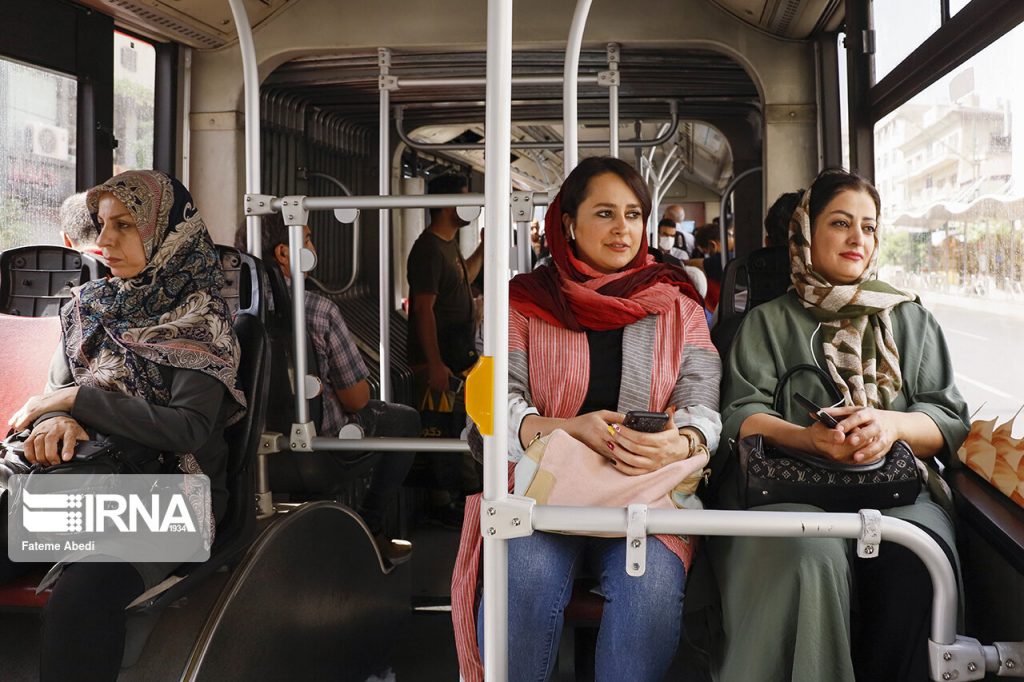
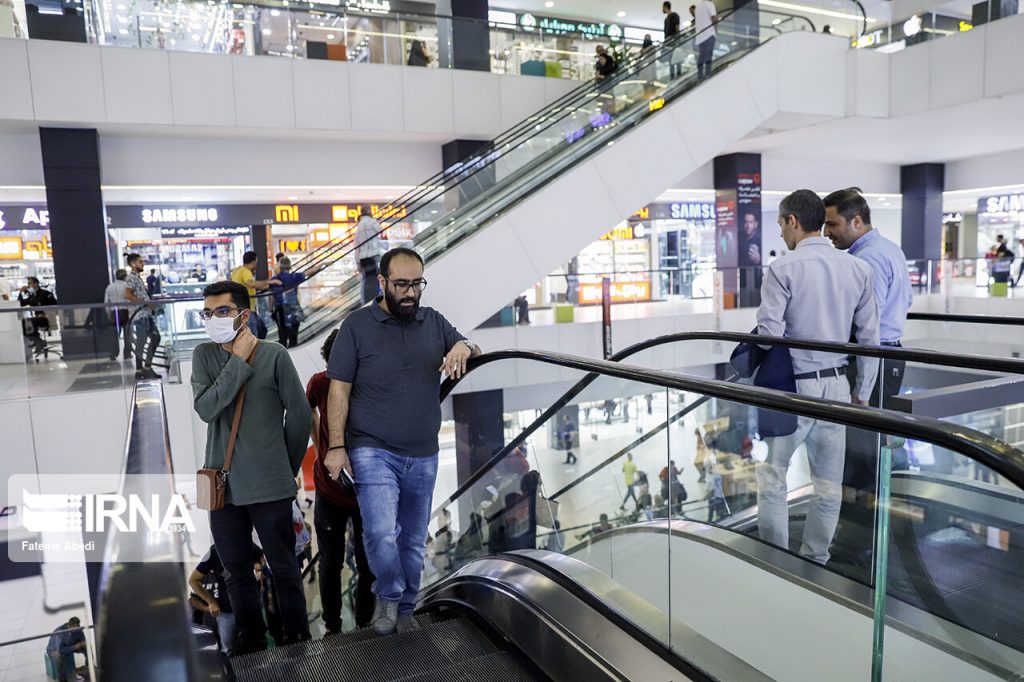
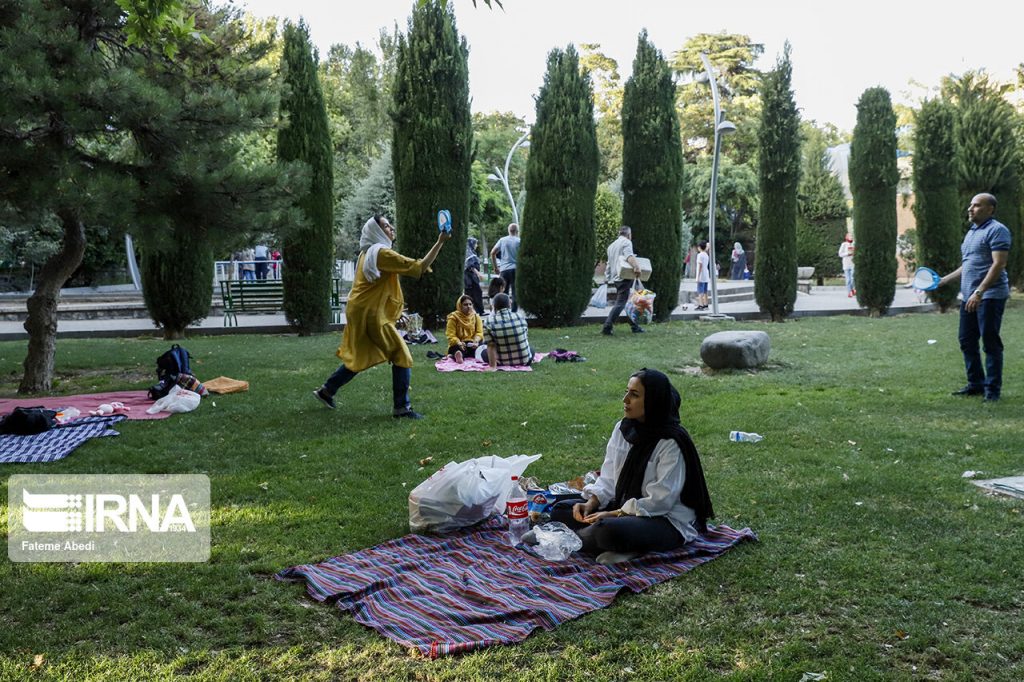

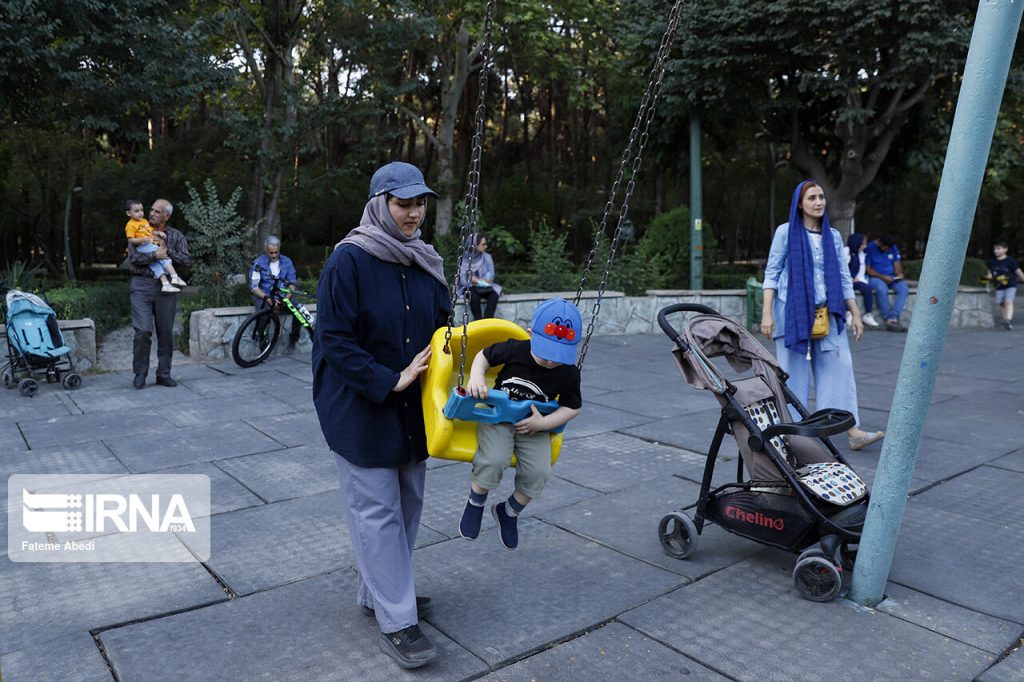
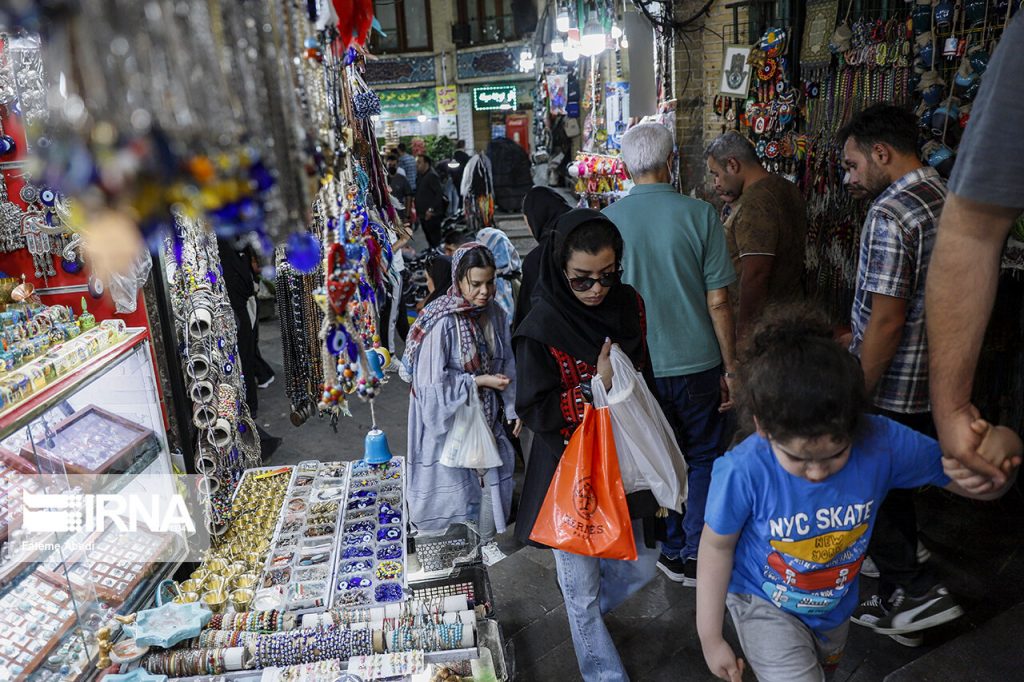
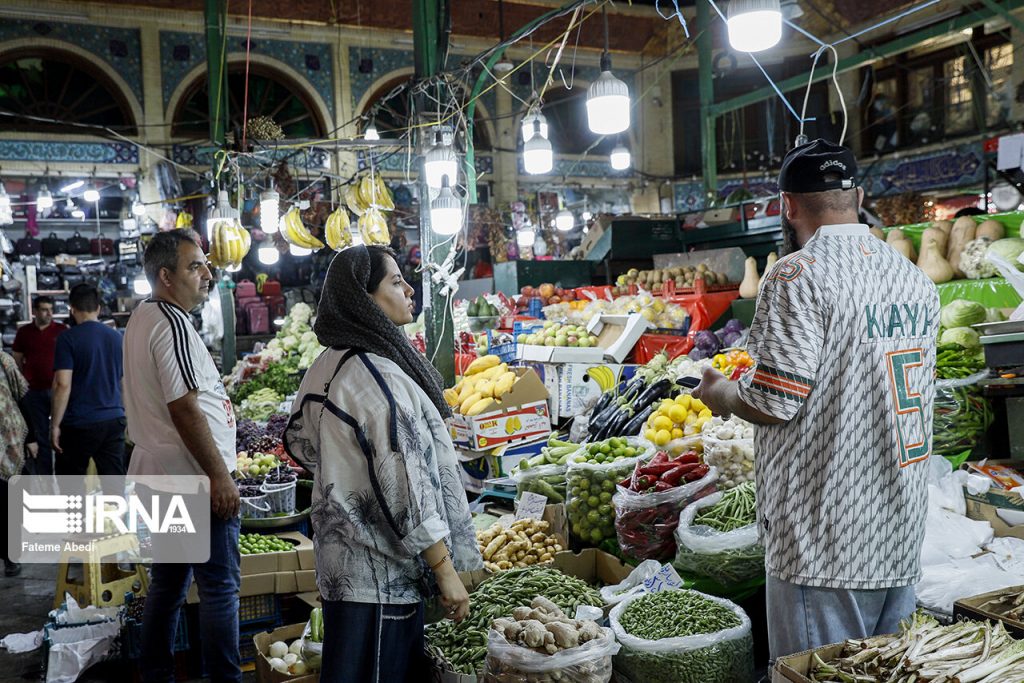
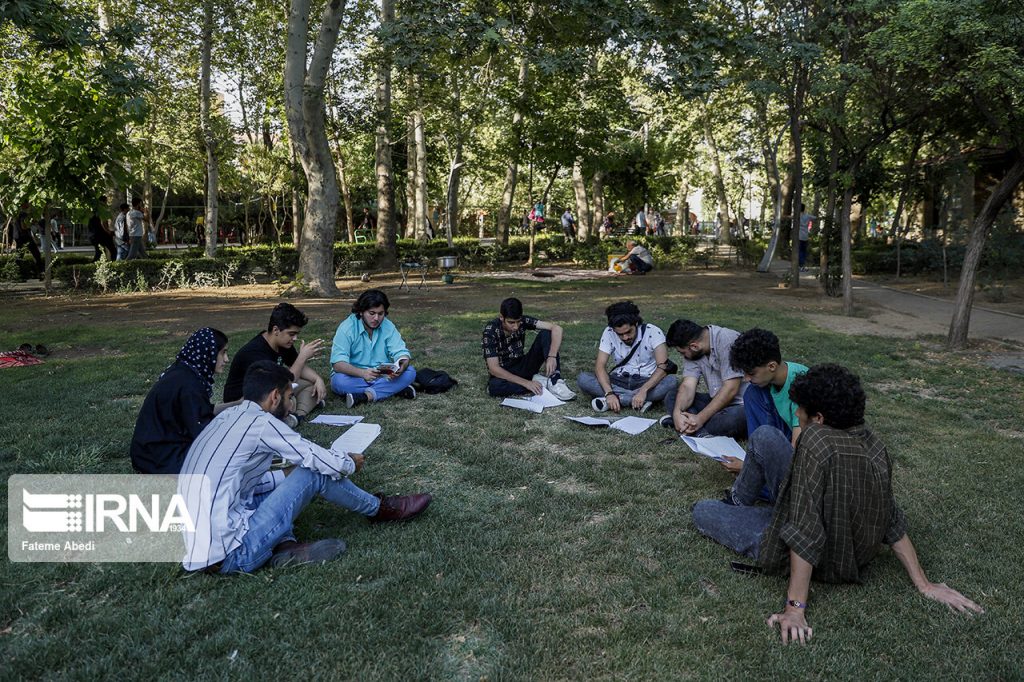
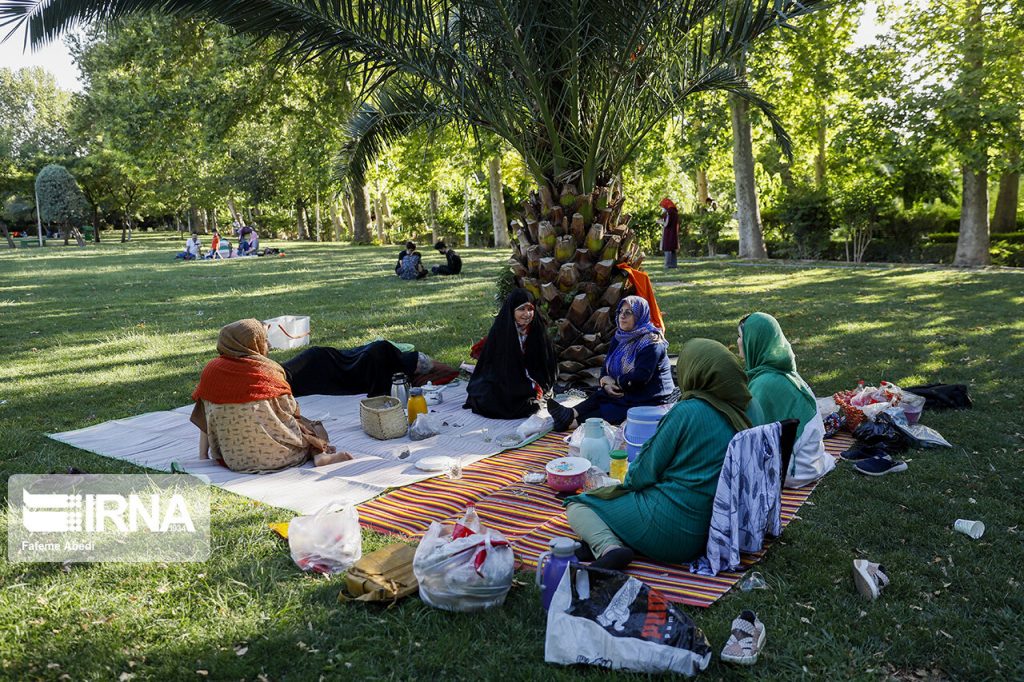
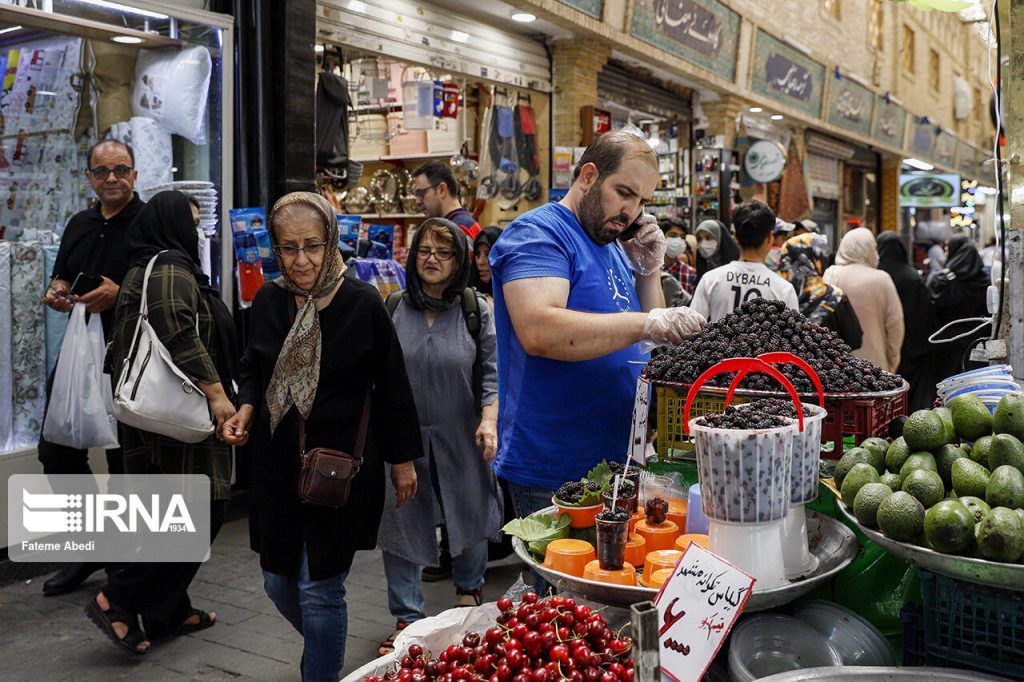
Corona Covid-19 Statistics in IRAN
Iran was able to overcome the corona epidemic crisis by vaccinating 76% of the target population. Until July 11, 2022, according to the statistics, 64,647,488 people have injected the first dose of vaccine, 58,000,921 people have injected the second dose, and 27,754,172 people have injected the third dose of vaccine. Sinopharm, AstraZeneca, Sputnik V, PastoCovac, COVIran Barekat and Iranian-Australian Spikogen were the vaccines that were injected into people in Iran.
According to the official statistics of Iran’s Ministry of Health, 7,238,840 people have been infected with Corona and 141,390 people have died.
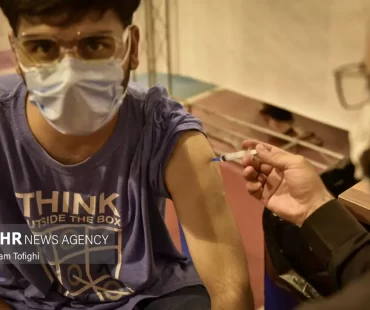
Some Corona Covid-19 vaccination centers in Tehran are working 24/7 in line with the government’s instructions to step up the general vaccination rate.
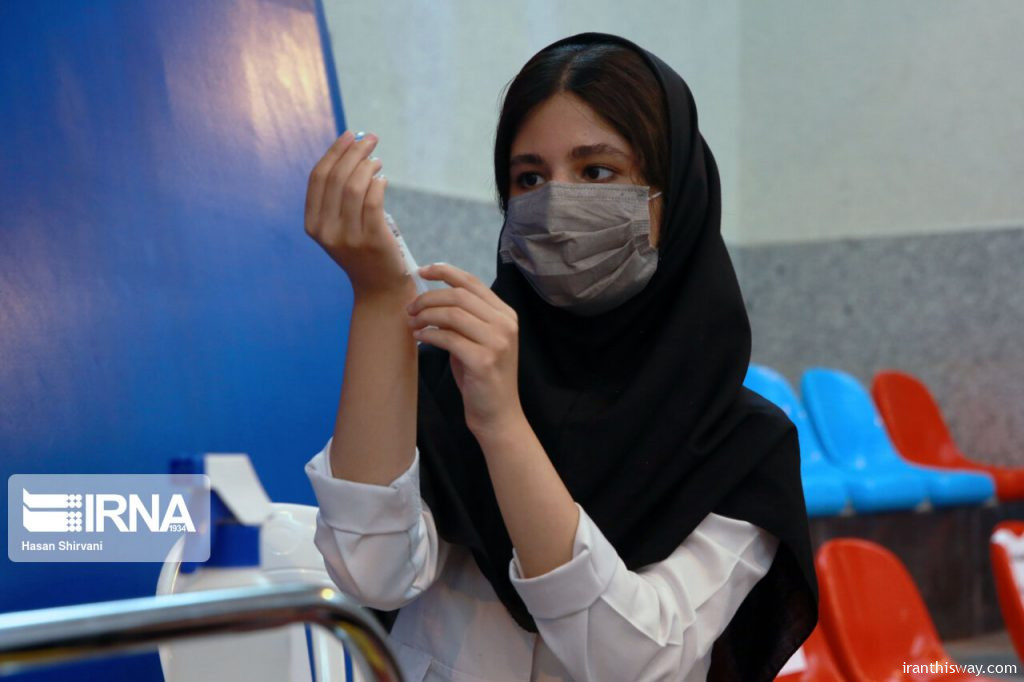
IRAN to administer 50 mn Corona vaccines by end of summer
Iran’s new Health Minister Bahram Einollah has said that the country will break Germany’s record of weekly administering of 5 million doses of vaccines.
Speaking to reporters after attending a meeting with the Iranian lawmakers on Tuesday, Bahram Einollah, the new Iranian health minister said that the general vaccination of the Iranian people is gaining momentum, adding that the country will administer 50 million doses of Covid-19 vaccines by the end of summer.
He said while at the end of the previous administration in the middle of summer only 5 million doses of vaccines had been administered in the country, while after the new administration took office, the campaign accelerated and now the vaccination rate has exceeded more than 38 million of doses.
The new health minister added that the vaccination of 18-year-old people will begin very soon.
According to him, efforts are underway to vaccinate students and young people quickly.
He also said that soon all those who want to leave the country should have received two doses of vaccine, and upon their return to the country, they must have a negative PCR test in order to avert a new wave of the coronavirus in the country.
Einollah also noted that the new government in Iran under President Ebrahim Raeisi has authorized the domestic production of five Covid-19 vaccines.
Meanwhile, the spokesman for Iran’s National Task Force for Fighting Covid-19 Alireza Raeisi who said that the country has not got through the deadly fifth wave of the Covid-19.
Raeisi predicted that the daily death toll from the pandemic in Iran will decline from the current 500 to below 50 people in the middle of fall, when a large portion of the Iranian population has received both doses of the vaccines.
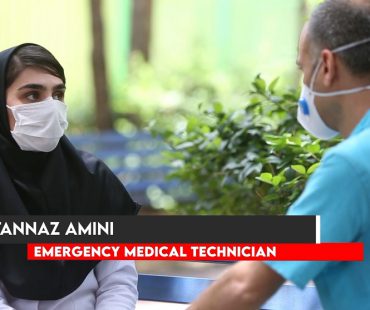
By: Sadeq Hosseini, Farbod Khalili: IranThisWay.com| Coronavirus has become a household name in its short existence among us. Months of lockdown and extreme caution have turned us all into self-proclaimed virologists and epidemiologists. So, by now, you should know well that staying home is one of the best and easiest ways to help prevent the spread of COVID-19.
But have you ever wondered what happens to the homeless?
After all, they are among the most vulnerable to coronavirus.
Figures show at least two percent of the world’s population -or about 150 million people- does not have a home.
The pandemic shut down homeless shelters, just like other public places and businesses, over fears that outbreaks in crowded facilities with vulnerable people in poor health could be catastrophic.
Therefore, hotels, parking lots, stadiums, and other facilities that could house rough sleepers were turned into emergency shelters for the homeless.
Tehran, just like other megacities, is dealing with the homelessness problem. Some studies put the number of the capital’s rough sleepers at around 10 thousand. But data provided by the municipality shows homeless shelters do not operate on full capacity in warmer months of the year. In other words, the homeless prefer to stay homeless unless it is absolutely necessary! But the outbreak changed everything.
There are currently 62 social service shelters operating across Tehran with the capacity of over 64 hundred. Every year, about 300 thousand people -the homeless, street beggars, and other needy individuals- use the services provided by these centers. They range in age from 18 to 90 years. But most of the homeless are between 35 to 40 years old.
Soon after the emergence of the outbreak, Tehran municipality took extreme precautionary measures in line with general health protocols to prepare these homes for the new situation.
We are on in a shelter for homeless women in a western neighborhood of Tehran. Tehran municipality built and equipped this place with the help of donors.
One of the early challenges facing almost all cities all around the world was the shortage of face masks. And this was no exception for the shelters. In fact, given that most of the homeless suffer from long term conditions, becoming infected with the virus could have severe consequences for them. So, the shelters started to produce their own masks; thousands of them every day.
Roqiyeh Beigzadeh, Social worker: Chitgar homeless shelter for women has a bed capacity of 450. Currently around 150 people – mainly addicts and those rejected by their families- between the ages of 18 to 60 reside here. The center is open 24/7, and aside from providing three hot meals, it also offers medical and psychiatric services and consultations to individuals, and works to reunite them with their families.
Beigzadeh said: Coronavirus made our work much harder since we had to check the residents’ symptoms and disinfect the facility on a daily basis, as well as providing prevention training for them.
She added: A face mask production workshop was assembled with the help of the residents to produce, disinfect and package between 500 to 1000 masks daily.
Aida, 37 years old: The safe space this center creates, as well as the possibility of staying around the clock and, of course, the excellent rapport with social workers are some of the more important reasons convincing me to stay here for a long time. Here we have everything a woman needs. We were quarantined after the emergence of the outbreak. Our symptoms like fever were checked, and thank God I had no problem here. I go out with my friends here from time to time to take care of my personal and sometimes administrative work. There is a theater, a library and sports equipment, and I use these facilities.
Tanaz Amini, Emergency medical technician & paramedic: During this time we only had one suspicious case who was then sent to the hospital and later diagnosed with an overdose. Aside from that, we have had no other suspicious cases in the three months since the start of the outbreak. In the early days, the homeless would not accept the new health protocols and resisted them. But with the passage of time and some training, they would come to us to have their symptoms checked and make sure they did not have the disease.
This is Khavaran Shelter in southeast of Tehran with a 600 bed capacity. Until before coronavirus, its sleeping capacity was never even nearly full in spring and summer. But now, the capacity has been increased to 1000.
Abbas Nejad, Technical assistant, Khavaran shelter: The shelter has a capacity of 450 people, and it admits people from 18 to 80 years old. With the spread of coronavirus and the closure of other addiction treatment centers, there’s been an increase in the number of referrals. Following the announcement of health protocols, our job became harder. Accordingly, we disinfect the complex several times a day. Before admission, we disinfect the individuals. They have seperate beds.
Pirouz Hanachi, Tehran mayor : The 21 shelters of Tehran host about 66,000 people every month. The individuals receive three meals a day as well as medical care. Despite the fact the shelters are often crowded, we have not recorded any covid-19 since the start of the outbreak.
Tehran mayor said: We achieved this feat with help from the individuals themselves – after receiving proper training and equipment like face masks- and following the implementation of strict health protocols like constant disinfection of the facilities.
Tehran was one the first and worst-hit cities in the world. The early days of the pandemic were chaotic with people panic buying sanitary products and staple food items. But even back then, the municipality never seized its services to the most vulnerable and the needy. And that’s why no one -not a single soul- in the homeless population has contracted the disease so far; a truly remarkable feat.
We are a strong nation. We have experienced all sorts of ups and downs in recent history only to come on top successfully every single time. So, I’m sure we will put this crisis behind us with flying colors. But this doesn’t mean we should relax precautions.
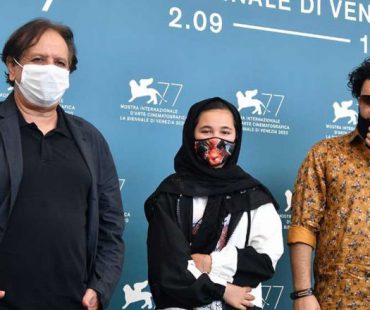
A film critic for the Hollywood Reporter, Deborah Young praised the Iranian film “Sun Children” (Khorshid) directed by Majid Majidi, saying the film should be a frontrunner in Venice competition.
“Iranian director Majid Majidi has made some of the most visually stunning and emotionally stirring films in world cinema about the plight of under-privileged, exploited and abused young people, and Sun Children (Khorshid) is one of his very best. The story of street boys commissioned by a local boss to dig for a treasure unfolds around an urban schoolyard and the clever, freckled face of 12-year-old Ali (Roohollah Zamani), a stereotype-buster of non-stop courage. The movie won best film, best screenplay and best production design kudos at this year’s Fajr Film Festival and should be a frontrunner in Venice competition,” Deborah Young wrote.
“Majidi’s Children of Heaven (1998) was the first Iranian film to be nominated for an Academy Award in the foreign language category. Though Sun Children lacks the visual lushness and poetry that made Children of Heaven so seductive, its condemnation of child labor and the inaccessibility of basic education to the poor comes across with great force,” she added.
“Post-revolutionary Iranian films have often drawn from the well of children’s problems to outflank the censors and score their social critiques. The screenplay written by Majidi and co-scripter Nima Javidi (Melbourne) pins its outrage to a swift-moving, high-stakes plot that undercuts sentimentality and the conventions of the exploited-child genre,” Deborah Young went on to say.
“Sun Children” is one of the 18 feature films selected for the competition section and will compete for winning the festival top prize, the Golden Lion.
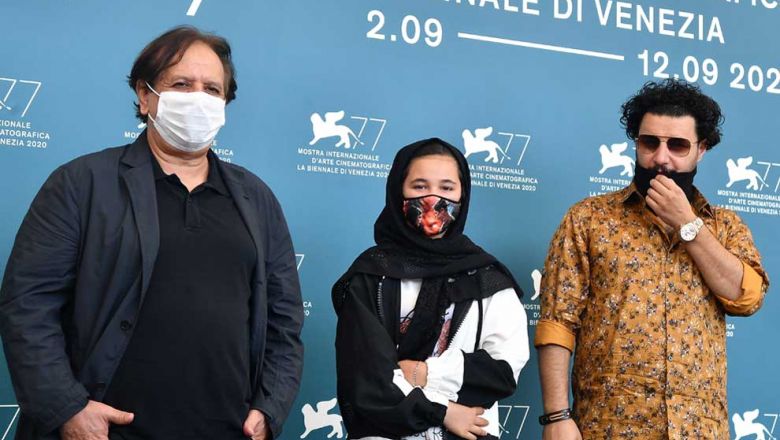
The 77th Venice International Film Festival will take place at Venice Lido from 2 – 12 September 2020. This will be the first major international film event to take place physically since the beginning of the coronavirus pandemic.
It took Majid Majidi four months and nearly 4,000 auditions to find the dynamic street children stars of Khorshid (Sun Children), the Iranian director’s latest movie premiering Sunday in Venice.
But the five kids lucky enough to be cast – one of whom accompanied Majidi to the prestigious Venice film festival on the Lido – are just a handful of the world’s 152 million street children who face a grim future without society’s intervention, the director said.
“Many of these kids are selling items in the streets, or underground. They have the worst conditions but it’s not limited to Iran, it’s everywhere, unfortunately.”
Despite the heavy subject matter, an adventure story plot and Majidi’s ability to find humanity and humour in the face of adversity help highlight the spirit, intelligence and potential of Majidi’s young subjects.
In the film, 12-year-old Ali [Rouhollah Zamani] and his three friends help support their families through odd jobs, even stealing a tyre or two. One day, they are told a hidden treasure is buried underneath a school for street children. To dig for it, they must enrol.
Majidi said he deliberately sought a light touch, even including unexpected moments of humour that had the audience cheering at a press screening.
“The topics are already very sad, very heavy. So in order to be able to keep the viewers engaged, you don’t need to force them into a heavy, sad situation,” Majidi told AFP, speaking through an interpreter.
“I wanted to do a mixture of light and heavy and play between those so people can stand to watch this misery.”
The film is one of 18 in competition for the festival’s top prize, the Golden Lion.
Working at five
Just before departing for the festival, lead actor Zamani tested positive for coronavirus and could not travel, Majidi said, adding that the youngster was fine, though disappointed.
Actress Shamila Shirzad, 13, made the trip, however. In the film, Shirzad and her younger brother played roles that differed little from their actual lives. As Afghans without papers in Tehran, they worked selling items in the subway while living under the constant threat of their family being sent to a refugee camp.
“I was born in Iran and started working when I was five and went to school,” where Majidi found her, she said at a press conference.
Some three to four million Afghans are currently living in Iran, their situation worsened by their illegal status and the prejudice they face, said the director, whose 2001 film, Baran focused on Afghan refugees in Iran.
Majidi warned that the plight of street children was not limited to one country or region, saying the world could not afford to ignore these kids’ potential.
“These [children] are supposed to be the future of humanity, and what is happening to the future of humanity is disastrous,” Majidi said.
Responsibility goes “beyond the state,” he said.

“The responsibility is to understand and be aware of the children’s situation, and that concerns us all, not just those who govern us.”
Majidi and a number of crew members are on the Italian Lido to promote the film at the major international film event.
“What is portrayed in the film is a global issue that is not limited to one country, but the damage some West Asian countries are facing due to wars is more serious,” Majidi lamented.
“Our country has been under severe sanctions imposed by the U.S. government over the past 40 years, and at present, since coronavirus is a mutual affliction all over the globe, one of our most serious problems is that these sanctions threaten access to certain medicines,” he added.
He said that children and families are most vulnerable to wars and political upheavals, and added, “Iraq, Pakistan, Afghanistan, Turkey and our other neighboring countries are always suffering from wars and political crises.”
One of Iran’s serious problems is that people have illegally emigrated from these countries to Iran as a result of the wars and regional crises.
The cast members of “Sun Children”, Shamila Shirzad and her brother, Abolfazl, are two children born to an Afghan family in Iran.
These two, as well as other child members of the cast, were selected through auditions that Majidi held among the children making a living from peddling in the Tehran metro.
“A key topic the film intends to emphasize is the social responsibility people have in their societies,” Majidi said and added, “Governments are not my problem in this film, but I want to say that people should fulfill their own social duties and responsibilities on each issue.”
In their Twitter accounts, Cinema Organization of Iran director Hossein Entezami and Fajr Film Festival president Ebrahim Darughezadeh praised Majidi’s remarks during the press conference at the Venice festival.
“An artist is the voice of the people,” Entezami commented, while Darughezadeh wrote, “Majidi used the opportunity at the Venice festival to condemn the oppression of the Iranian people and violation of their rights.”
Celluloid Dreams, a major French film production and distribution company, is handling international sales. “Sun Children” premiered during February in Tehran at the 38th edition of the Fajr Film Festival, which honored it with the Crystal Simorgh for best film.
Co-written by Majidi and Nima Javidi, the film also won the award for best screenplay.
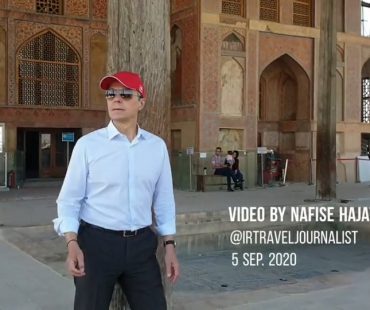
Referring to the 100th anniversary of the establishment of political and diplomatic relations between Iran and Switzerland , the Swiss Foreign Minister Ignazio Cassis came to Iran.
The swiss FM first destination was Isfahan; land of culture & UNESCO world heritage sites. The reason why he travel to Iran is to mark the centenary of swiss-Iran diplomatic relations so he stayed one day and two nights in Isfahan, visited seven monuments (including mosques,cathedral,royal palaces,Persian garden,carvansaray changed to 5-star hotel,traditional house changed to a hotel and UNESCO world heritage square.
Ignazio Cassis tweet:“Visit to the city of Isfahan, a pearl in the Middle East. Knowing the culture and people of a country…”
Video Report: Nafiseh Hajati
The traveler Mag introduce the 50 Most Beautiful Cities in the World and Isfahan is one of it.

We seek beauty in many forms: through art and architecture; from water views and mountain highs; in its people and its history. This list circles the globe, finding the most beautiful cities in the world from Italy to Iran. Vote for your favorite cities in the 2016 Readers’ Choice Awards survey.
Once one of the largest cities in the world, Isfahan had such serious cosmopolitan clout in the 16th century that it inspired the phrase Isfahan nesf-e jahan, or “Isfahan is half the world.” Today, it’s is one of the country’s largest metropolises, and has wide, tree-lined boulevards, significant Islamic architecture, and hidden Persian gardens, all perfect for exploring.
cosmopolitan clout in the 16th century that it inspired the phrase Isfahan nesf-e jahan, or “Isfahan is half the world.” Today, it’s is one of the country’s largest metropolises, and has wide, tree-lined boulevards, significant Islamic architecture, and hidden Persian gardens, all perfect for exploring.